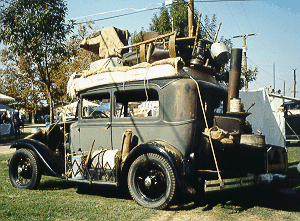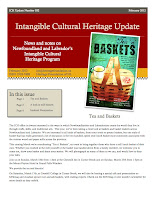Ethnology at the Crossroads
CALL FOR PAPERS, Workshops or Roundtables
May 26-28, Waterloo, Ontario
The FSAC/ACEF 2012 conference will be held with the Congress of the Humanities and Social Science, in Waterloo, Ontario and co-hosted by Wilfrid Laurier University and the University of Waterloo. The theme for this year's Congress is Crossroads: Scholarship for an Uncertain World.
Building on the Congress 2012 theme, the theme for our meeting will be Ethnology at the Crossroads. Ethnologists and Folklorists are committed to engaging with topics that fall at the crossroads and margins of our societies. As our discipline has developed, we have often found ourselves as lone members in diverse departments, and therefore have brought our unique methodologies and theories to interdisciplinary research groups. We have often studied the practices that occur when cultures cohabitate and influence each other (or purposefully remain uninfluenced by each other). We work with populations who are confronted with their own crossroads; facing changes in the economy, family composition, social constructs, and technology.
Suggested paper topics include:
* The future of Ethnology and/or Folklore in Canada
* Canadian responses to the UNESCO 2003 convention on Intangible Cultural Heritage
* Cultural "crossroads"; both past and present
* Disciplinary intersections; experiences and best practices
Proposals dealing with other topics will also be considered as space permits. Applications for Panels and Workshops are strongly encouraged.
PLEASE NOTE, IN ORDER TO BE CONSIDERED:
1) All applicants are required to fill out the attached form-fillable PDF form ONLY and email it to Jodi McDavid. Please adhere to the space provided for your abstract. Please indicate any AV needs in the space provided on your form.
Be sure to include your strict maximum 100-word abstract for your formal presentation (in English and French if possible, or simply in your first language) along with your name, department, institutional affiliation, and contact information by February 15, 2012.
2) Hard copy/surface mail submissions of abstracts will not be accepted.
3) Only current members may participate in this event or have their submission considered (see membership form). Your abstract will not considered until the Secretary-Treasurer has received your membership fee, preferably via Paypal, although cheques are also accepted.
NEW THIS YEAR:
The Association no longer charges a translation fee, to avoid varying quality in supplied translations, and unnecessary pressure on our administration.
We are attempting to move into a fully-electronic system of membership payment, abstract submission, and communication. Please join us in this endeavour!
FSAC CONFERENCE FEES will be collected by Congress, and is $30 for all delegates, however, when meeting with Congress, you also must pay Congress fees. 2012 fees have not yet been set, for comparison, in 2011 early registration fees were $55 Congress fees + $30
FSAC fees (unwaged, student, underemployed, etc.), regular member $150 Congress + $30 FSAC fees.
Accommodation & Travel
How to get to Waterloo:
http://congress2012.ca/attend/how-to-get-to-waterloo/On campus accommodation:
http://congress2012.ca/wp-content/uploads/2011/10/On-Campus-Accommodation-Options_FINAL.pdf Where to stay in Waterloo:
http://congress2012.ca/attend/where-to-stay-in-waterloo/ Some funds are available for member reimbursement. See the Travel Funding Policy to see if you qualify:
http://www.acef.ulaval.ca/voyageaf.htm



















